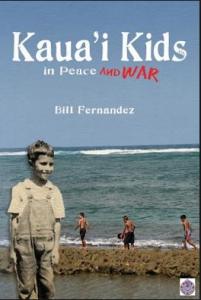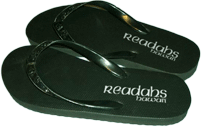 In Bill Fernandez’s previous book, Rainbows Over Kapaʻa, the author touched on the expansive history of the small town he grew up in, “a place of opportunity for the less fortunate,” where the identity of Kapaʻa forged itself without the typical background of being a sugar plantation village. In Fernandez’s new book, Kauaʻi Kids in Peace and WAR, Bill takes us back to his quaint town where readers are thrust into a specific time and place as he recounts his childhood adventures in Kapaʻa during the 1930’s, stretching into the lean years of World War II Kauaʻi.
In Bill Fernandez’s previous book, Rainbows Over Kapaʻa, the author touched on the expansive history of the small town he grew up in, “a place of opportunity for the less fortunate,” where the identity of Kapaʻa forged itself without the typical background of being a sugar plantation village. In Fernandez’s new book, Kauaʻi Kids in Peace and WAR, Bill takes us back to his quaint town where readers are thrust into a specific time and place as he recounts his childhood adventures in Kapaʻa during the 1930’s, stretching into the lean years of World War II Kauaʻi.
Fernandez does a magnificent job recalling the details of his childhood. It’s hard not to smile reading descriptions of how toys and games were crafted through resourceful childhood imagination. The accounts are both descriptive and well-written with the detailed specifics providing a strong sense of setting. The first half of the book is filled with these accounts such as being told to eat all your food because “of all the starving kids in China,” or finding pleasure in simple things like watching farm animals teach you about life and bartering and trading for subsistence. Many of these tales of innocence are punctuated with life lessons at the end of each short story, putting things into perspective. A massive flood becomes an excuse for the boys to play naval war games in tin canoes while the grown-ups struggle to save their homes and businesses. To a young Bill, “events occurring across the seas seemed remote to the people of our island. A broad ocean formed an insurmountable barrier to war.”
The second half of the book recounts Kauaʻi in the midst of World War II. From a “mahapi” attitude, to fear and rationing, the tone of the book suddenly changes as a young Bill wonders if he’ll become a “prisoner of Japan.” One of the early stories to spread among the island is that of the downed Zero pilot Nishikaichi, who landed on Niʻihau, and with the help of a local Japanese-American family, terrorized the island for a couple of days. This event, which the book then goes on to suggest as a catalyst to Japanese-American internment, has a profound effect on the rationale of people in Hawaiʻi. Although young Bill believes his neighbors are loyal, there is still a wavering mistrust of these Japanese friends and neighbors as a result and ultimately a sense that Kauai would truly be defenseless if the War came to his shore.
Kauaʻi Kids is an intriguing memoir, one I feel is a significant step forward from his previous. By setting the story within the narrative frame of his childhood and the greater parables of 1930’s Hawaii and World War II, Fernandez crafts a tale of rich memories and unique experiences that help better bring the reader into the encapsulated world of this island and this town. Mahalo Bill Fernandez, for sharing your small-kid adventures and perpetuating the history of Kapaʻa and Kauaʻi.
For more information on Bill Fernandez and his books, visit kauaibillfernandez.com.
[gn_divider /]EVENT: If you want to hear more stories from Bill Fernandez, then I wholly recommend you to see him at a book launch celebration for Kauaʻi Kids, TODAY, Sunday, October 13 at Native Books (Ward Warehouse) from 2:00 PM to 4:00 PM.




